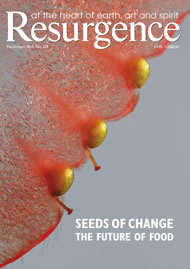“Developing spirituality”, Ursula King writes, can be described as “creating an oasis for the soul”. It is about making a place for nurturing the deepest wellsprings of our human being. So it is as much a process of creating an internal space for learning, maturing and growing the spiritual self, as about finding spiritual places and activities in the material world.
King’s most acute contribution to the burgeoning literature on cross-cultural spiritualities is her focus on what it is to be spiritual and human. Too many texts on spirituality have focused on otherworldly aspects or purely personal dimensions. But, for King, spirituality is embodied in us and the daily dance of life according to our age, education, health and gender. Moreover, the dynamism and trans-formative qualities of spirituality are enacted in our relationships, through networks and in society. And our increasing knowledge of the interdependence of our societies and relationship with the natural world, against the depredations of war, injustice and planetary abuse, promotes a contemporary moral imperative. It is, she declares, a socially involved and ethically engaged ‘spirituality of living in the world’ that is now most needed.
To readers of Resurgence these themes have been expressed eloquently before, but what King has to offer to this discourse is a knowledge and wisdom of global religious traditions accumulated over her life as an academic scholar of religions and passionate advocate of the breadth of human religious experience.
She brings her own experience as a woman and a mother to understanding spiritual engagement and is critical of historical and contemporary spiritualities that ignore these elements for while spiritual ideals are ultimately gender-transcendent, they are far from gender-neutral. Historically they are “shaped by deeply embedded patriarchal and androcentric (male-centred) thought” which only appear to be gender-neutral. But spiritual teachings offered to assumed asexual beings often turn out to be “anti-body, anti-woman and anti-world”. For King some of the ascetic traditions and overly personalist and narcissistic spiritualities have been life-denying and consequently world- and life-harming.
The search for spirituality in the contemporary context is more inclusive, holistic and purposive. Thus, taking her lead from the mujerista theologians of Latin America who speak of spirituality in terms of “struggle for life” and “cry for life”, King describes the creative and dynamic contemporary spiritualities as “spiritualities for life”. This is contra to other commentators, such as Paul Heelas, who describes ‘spiritualities of life’ as facets of a “subjective wellbeing culture”, or Richard King and Jeremy Carrette, who define contemporary spiritualities as examples of consumer culture par excellence. Spiritualities for life, however, are active rather than passive, in promoting nurturing, nourishing and flourishing in global, environmental and social contexts.
The ideas of wellness and wellbeing are common currents in contemporary society interpreted and defined in many ways. For many, including Ursula King, wellness and wellbeing are dependent on spiritual engagement throughout life and in all contexts of life. They relate fundamentally to questions about what it is to be human and to become fully human. Spirituality, she states, is an essential element of human being, and human wellbeing, which needs to be activated and realised. Thus education, work and lifelong learning are as central to spiritual being as are specifically spiritual exercises.
Yet, though King is by no means a miserabilist about the state of contemporary spiritualities (indeed, she emphasises truly positive notions of the ‘zest for life’ and the flourishing of spiritual capabilities), she recognises there are gaps in our current spiritual resources: “A global spiritual awakening has to occur on a much larger scale than exists at present.” While she does not offer a thorough analysis of why this lack of spiritual resources exists, King offers examples and directions where individuals and organisations are working towards spiritual awakening. These individuals are well described by one of King’s own examples, Pitirim Sorokin, as “eminent apostles of love”. Love is a fundamental wellspring of spiritual growing, and those who recognise its power to transform are pre-eminent in spiritual awakening.
In many ways The Search for Spirituality is itself a sourcebook useful in building an oasis for the soul. What differentiates Ursula King’s work from others is her ability to provide examples of religious and spiritual traditions in a historical and global perspective. King is a felicitous writer, precise in her explanations and deeply engaging in the authority and wisdom of her understanding. This text gives a thorough examination of key spiritual teachings past and present and is further to be commended for over thirty pages of short summaries providing suggestions for further reading, themselves sources for spiritual growth. She has accomplished a balance of scholarly knowledge with profound personal spiritual insight. One leaves the book inspired and replenished; and readers of this text might observe a new flourishing in the oases of their souls.






